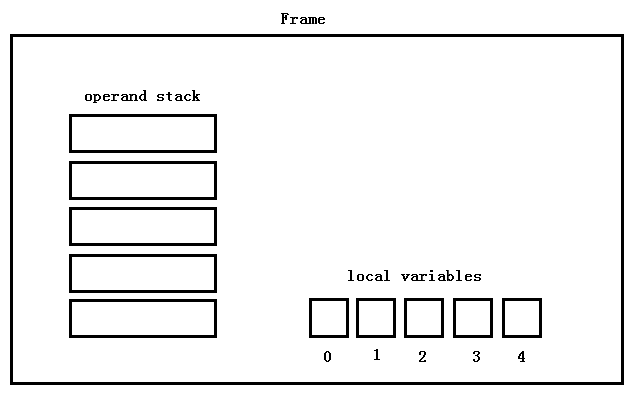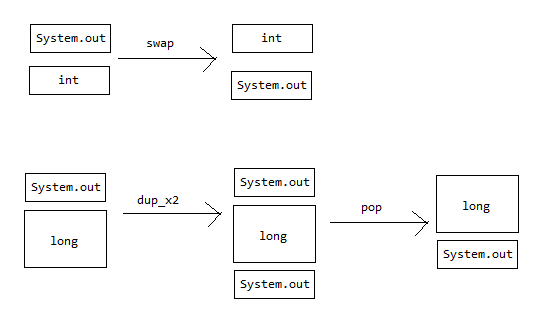预期目标
假如有一个 HelloWorld 类,代码如下:
public class HelloWorld {
public int test(String name, int age, long idCard, Object obj) {
int hashCode = 0;
hashCode += name.hashCode();
hashCode += age;
hashCode += (int) (idCard % Integer.MAX_VALUE);
hashCode += obj.hashCode();
return hashCode;
}
}
我们想实现的预期目标:打印出“方法接收的参数值”和“方法的返回值”。
public class HelloWorld {
public int test(String name, int age, long idCard, Object obj) {
System.out.println(name);
System.out.println(age);
System.out.println(idCard);
System.out.println(obj);
int hashCode = 0;
hashCode += name.hashCode();
hashCode += age;
hashCode += (int) (idCard % Integer.MAX_VALUE);
hashCode += obj.hashCode();
System.out.println(hashCode);
return hashCode;
}
}
实现这个功能的思路:在“方法进入”的时候,打印出“方法接收的参数值”;在“方法退出”的时候,打印出“方法的返回值”。
第一个版本
我们要实现的第一个版本是比较简单的,它是在 MethodAroundVisitor 类基础上直接修改得到的。
编码实现
import org.objectweb.asm.ClassVisitor;
import org.objectweb.asm.MethodVisitor;
import org.objectweb.asm.Opcodes;
import static org.objectweb.asm.Opcodes.*;
public class MethodAroundVisitor extends ClassVisitor {
public MethodAroundVisitor(int api, ClassVisitor classVisitor) {
super(api, classVisitor);
}
@Override
public MethodVisitor visitMethod(int access, String name, String descriptor, String signature, String[] exceptions) {
MethodVisitor mv = super.visitMethod(access, name, descriptor, signature, exceptions);
if (mv != null && !"<init>".equals(name)) {
boolean isAbstractMethod = (access & Opcodes.ACC_ABSTRACT) == Opcodes.ACC_ABSTRACT;
boolean isNativeMethod = (access & Opcodes.ACC_NATIVE) == Opcodes.ACC_NATIVE;
if (!isAbstractMethod && !isNativeMethod) {
mv = new MethodAroundAdapter(api, mv);
}
}
return mv;
}
private class MethodAroundAdapter extends MethodVisitor {
public MethodAroundAdapter(int api, MethodVisitor methodVisitor) {
super(api, methodVisitor);
}
@Override
public void visitCode() {
// 首先,处理自己的代码逻辑
super.visitFieldInsn(GETSTATIC, "java/lang/System", "out", "Ljava/io/PrintStream;");
super.visitVarInsn(ALOAD, 1);
super.visitMethodInsn(INVOKEVIRTUAL, "java/io/PrintStream", "println", "(Ljava/lang/String;)V", false);
super.visitFieldInsn(GETSTATIC, "java/lang/System", "out", "Ljava/io/PrintStream;");
super.visitVarInsn(ILOAD, 2);
super.visitMethodInsn(INVOKEVIRTUAL, "java/io/PrintStream", "println", "(I)V", false);
super.visitFieldInsn(GETSTATIC, "java/lang/System", "out", "Ljava/io/PrintStream;");
super.visitVarInsn(LLOAD, 3);
super.visitMethodInsn(INVOKEVIRTUAL, "java/io/PrintStream", "println", "(J)V", false);
super.visitFieldInsn(GETSTATIC, "java/lang/System", "out", "Ljava/io/PrintStream;");
super.visitVarInsn(ALOAD, 5);
super.visitMethodInsn(INVOKEVIRTUAL, "java/io/PrintStream", "println", "(Ljava/lang/Object;)V", false);
// 其次,调用父类的方法实现
super.visitCode();
}
@Override
public void visitInsn(int opcode) {
// 首先,处理自己的代码逻辑
if (opcode == Opcodes.ATHROW || (opcode >= Opcodes.IRETURN && opcode <= Opcodes.RETURN)) {
super.visitFieldInsn(GETSTATIC, "java/lang/System", "out", "Ljava/io/PrintStream;");
super.visitVarInsn(ILOAD, 6);
super.visitMethodInsn(INVOKEVIRTUAL, "java/io/PrintStream", "println", "(I)V", false);
}
// 其次,调用父类的方法实现
super.visitInsn(opcode);
}
}
}
进行转换
import lsieun.utils.FileUtils;
import org.objectweb.asm.*;
public class HelloWorldTransformCore {
public static void main(String[] args) {
String relative_path = "sample/HelloWorld.class";
String filepath = FileUtils.getFilePath(relative_path);
byte[] bytes1 = FileUtils.readBytes(filepath);
//(1)构建 ClassReader
ClassReader cr = new ClassReader(bytes1);
//(2)构建 ClassWriter
ClassWriter cw = new ClassWriter(ClassWriter.COMPUTE_FRAMES);
//(3)串连 ClassVisitor
int api = Opcodes.ASM9;
ClassVisitor cv = new MethodAroundVisitor(api, cw);
//(4)结合 ClassReader 和 ClassVisitor
int parsingOptions = ClassReader.SKIP_DEBUG | ClassReader.SKIP_FRAMES;
cr.accept(cv, parsingOptions);
//(5)生成 byte[]
byte[] bytes2 = cw.toByteArray();
FileUtils.writeBytes(filepath, bytes2);
}
}
验证结果
public class HelloWorldRun {
public static void main(String[] args) throws Exception {
HelloWorld instance = new HelloWorld();
int hashCode = instance.test("Tomcat", 10, System.currentTimeMillis(), new Object());
int remainder = hashCode % 2;
if (remainder == 0) {
System.out.println("hashCode is even number.");
}
else {
System.out.println("hashCode is odd number.");
}
}
}
小总结
缺点:不灵活。如果方法参数的数量和类型发生改变,这种方法就会失效。
那么,有没有办法来自动适应方法参数的数量和类型变化呢?答案是“有”。这个时候,就是 Type 类(org.objectweb.asm.Type)来发挥作用的地方。
第二个版本
编码实现
import org.objectweb.asm.ClassVisitor;
import org.objectweb.asm.MethodVisitor;
import org.objectweb.asm.Opcodes;
import org.objectweb.asm.Type;
import static org.objectweb.asm.Opcodes.*;
public class MethodParameterVisitor extends ClassVisitor {
public MethodParameterVisitor(int api, ClassVisitor classVisitor) {
super(api, classVisitor);
}
@Override
public MethodVisitor visitMethod(int access, String name, String descriptor, String signature, String[] exceptions) {
MethodVisitor mv = super.visitMethod(access, name, descriptor, signature, exceptions);
if (mv != null && !name.equals("<init>")) {
boolean isAbstractMethod = (access & ACC_ABSTRACT) != 0;
boolean isNativeMethod = (access & ACC_NATIVE) != 0;
if (!isAbstractMethod && !isNativeMethod) {
mv = new MethodParameterAdapter(api, mv, access, name, descriptor);
}
}
return mv;
}
private static class MethodParameterAdapter extends MethodVisitor {
private final int methodAccess;
private final String methodName;
private final String methodDesc;
public MethodParameterAdapter(int api, MethodVisitor mv, int methodAccess, String methodName, String methodDesc) {
super(api, mv);
this.methodAccess = methodAccess;
this.methodName = methodName;
this.methodDesc = methodDesc;
}
@Override
public void visitCode() {
// 首先,处理自己的代码逻辑
boolean isStatic = ((methodAccess & ACC_STATIC) != 0);
int slotIndex = isStatic ? 0 : 1;
printMessage("Method Enter: " + methodName + methodDesc);
Type methodType = Type.getMethodType(methodDesc);
Type[] argumentTypes = methodType.getArgumentTypes();
for (Type t : argumentTypes) {
int sort = t.getSort();
int size = t.getSize();
String descriptor = t.getDescriptor();
int opcode = t.getOpcode(ILOAD);
super.visitVarInsn(opcode, slotIndex);
if (sort == Type.BOOLEAN) {
printBoolean();
}
else if (sort == Type.CHAR) {
printChar();
}
else if (sort == Type.BYTE || sort == Type.SHORT || sort == Type.INT) {
printInt();
}
else if (sort == Type.FLOAT) {
printFloat();
}
else if (sort == Type.LONG) {
printLong();
}
else if (sort == Type.DOUBLE) {
printDouble();
}
else if (sort == Type.OBJECT && "Ljava/lang/String;".equals(descriptor)) {
printString();
}
else if (sort == Type.OBJECT) {
printObject();
}
else {
printMessage("No Support");
if (size == 1) {
super.visitInsn(Opcodes.POP);
}
else {
super.visitInsn(Opcodes.POP2);
}
}
slotIndex += size;
}
// 其次,调用父类的方法实现
super.visitCode();
}
@Override
public void visitInsn(int opcode) {
// 首先,处理自己的代码逻辑
if ((opcode >= IRETURN && opcode <= RETURN) || opcode == ATHROW) {
printMessage("Method Exit:");
if (opcode == IRETURN) {
super.visitInsn(DUP);
Type methodType = Type.getMethodType(methodDesc);
Type returnType = methodType.getReturnType();
if (returnType == Type.BOOLEAN_TYPE) {
printBoolean();
}
else if (returnType == Type.CHAR_TYPE) {
printChar();
}
else {
printInt();
}
}
else if (opcode == FRETURN) {
super.visitInsn(DUP);
printFloat();
}
else if (opcode == LRETURN) {
super.visitInsn(DUP2);
printLong();
}
else if (opcode == DRETURN) {
super.visitInsn(DUP2);
printDouble();
}
else if (opcode == ARETURN) {
super.visitInsn(DUP);
printObject();
}
else if (opcode == RETURN) {
printMessage(" return void");
}
else {
printMessage(" abnormal return");
}
}
// 其次,调用父类的方法实现
super.visitInsn(opcode);
}
private void printBoolean() {
super.visitFieldInsn(GETSTATIC, "java/lang/System", "out", "Ljava/io/PrintStream;");
super.visitInsn(SWAP);
super.visitMethodInsn(INVOKEVIRTUAL, "java/io/PrintStream", "println", "(Z)V", false);
}
private void printChar() {
super.visitFieldInsn(GETSTATIC, "java/lang/System", "out", "Ljava/io/PrintStream;");
super.visitInsn(SWAP);
super.visitMethodInsn(INVOKEVIRTUAL, "java/io/PrintStream", "println", "(C)V", false);
}
private void printInt() {
super.visitFieldInsn(GETSTATIC, "java/lang/System", "out", "Ljava/io/PrintStream;");
super.visitInsn(SWAP);
super.visitMethodInsn(INVOKEVIRTUAL, "java/io/PrintStream", "println", "(I)V", false);
}
private void printFloat() {
super.visitFieldInsn(GETSTATIC, "java/lang/System", "out", "Ljava/io/PrintStream;");
super.visitInsn(SWAP);
super.visitMethodInsn(INVOKEVIRTUAL, "java/io/PrintStream", "println", "(F)V", false);
}
private void printLong() {
super.visitFieldInsn(GETSTATIC, "java/lang/System", "out", "Ljava/io/PrintStream;");
super.visitInsn(DUP_X2);
super.visitInsn(POP);
super.visitMethodInsn(INVOKEVIRTUAL, "java/io/PrintStream", "println", "(J)V", false);
}
private void printDouble() {
super.visitFieldInsn(GETSTATIC, "java/lang/System", "out", "Ljava/io/PrintStream;");
super.visitInsn(DUP_X2);
super.visitInsn(POP);
super.visitMethodInsn(INVOKEVIRTUAL, "java/io/PrintStream", "println", "(D)V", false);
}
private void printString() {
super.visitFieldInsn(GETSTATIC, "java/lang/System", "out", "Ljava/io/PrintStream;");
super.visitInsn(SWAP);
super.visitMethodInsn(INVOKEVIRTUAL, "java/io/PrintStream", "println", "(Ljava/lang/String;)V", false);
}
private void printObject() {
super.visitFieldInsn(GETSTATIC, "java/lang/System", "out", "Ljava/io/PrintStream;");
super.visitInsn(SWAP);
super.visitMethodInsn(INVOKEVIRTUAL, "java/io/PrintStream", "println", "(Ljava/lang/Object;)V", false);
}
private void printMessage(String str) {
super.visitFieldInsn(GETSTATIC, "java/lang/System", "out", "Ljava/io/PrintStream;");
super.visitLdcInsn(str);
super.visitMethodInsn(INVOKEVIRTUAL, "java/io/PrintStream", "println", "(Ljava/lang/String;)V", false);
}
}
}
进行转换
import lsieun.utils.FileUtils;
import org.objectweb.asm.*;
public class HelloWorldTransformCore {
public static void main(String[] args) {
String relative_path = "sample/HelloWorld.class";
String filepath = FileUtils.getFilePath(relative_path);
byte[] bytes1 = FileUtils.readBytes(filepath);
//(1)构建 ClassReader
ClassReader cr = new ClassReader(bytes1);
//(2)构建 ClassWriter
ClassWriter cw = new ClassWriter(ClassWriter.COMPUTE_FRAMES);
//(3)串连 ClassVisitor
int api = Opcodes.ASM9;
ClassVisitor cv = new MethodParameterVisitor(api, cw);
//(4)结合 ClassReader 和 ClassVisitor
int parsingOptions = ClassReader.SKIP_DEBUG | ClassReader.SKIP_FRAMES;
cr.accept(cv, parsingOptions);
//(5)生成 byte[]
byte[] bytes2 = cw.toByteArray();
FileUtils.writeBytes(filepath, bytes2);
}
}
小总结
这种方式的特点就是,结合着 Type 类来使用,为方法参数的“类型”和“数量”赋予“灵魂”,让方法灵活起来。
Frame 的初始状态
在 JVM 执行的过程中,在内存空间中,每一个运行的方法(method)都对应一个 frame 空间;在 frame 空间当中,有两个重要的结构,即 local variables 和 operand stack,如下图所示。其中,local variables 是一个数组结构,它通过索引来读取或设置数据;而 operand stack 是一个栈结构,符合“后进先出”(LIFO, Last in, First out)的规则。

在方法刚进入时,operand stack 的初始状态是什么样的呢?回答:operand stack 是空的,换句话说,“栈上没有任何元素”。
在方法刚进入时,local variables 的初始状态是什么样的?相对来说,会比较复杂一些,因此我们重点说一下。对于 local variables 来说,我们把握以下三点:
- 第一点,local variables 是通过索引(index)来确定里的元素的,它的索引(index)是从
0开始计算的,每一个位置可以称之为 slot。 - 第二点,在 local variables 中,存放数据的位置:this- 方法接收的参数-方法内定义的局部变量。
- 对于非静态方法(non-static method)来说,索引位置为
0的位置存放的是this变量; - 对于静态方法(static method)来说,索引位置为
0的位置则不需要存储this变量。
- 对于非静态方法(non-static method)来说,索引位置为
- 第三点,在 local variables 中,
boolean、byte、char、short、int、float和reference类型占用 1 个 slot,而long和double类型占用 2 个 slot。
打印语句
一般情况下,我们想打印一个字符串,可以如下写 ASM 代码:
private void printMessage(String str) {
super.visitFieldInsn(GETSTATIC, "java/lang/System", "out", "Ljava/io/PrintStream;");
super.visitLdcInsn(str);
super.visitMethodInsn(INVOKEVIRTUAL, "java/io/PrintStream", "println", "(Ljava/lang/String;)V", false);
}
但是,有些情况下,我们想要打印的值已经位于 operand stack 上了,此时可以这样:
private void printString() {
super.visitFieldInsn(GETSTATIC, "java/lang/System", "out", "Ljava/io/PrintStream;");
super.visitInsn(SWAP);
super.visitMethodInsn(INVOKEVIRTUAL, "java/io/PrintStream", "println", "(Ljava/lang/String;)V", false);
}
对于 int 类型的数据,它在 operand stack 当中占用 1 个位置,我们使用 swap 指令来完成 int 与 System.out 的位置互换。
private void printInt() {
super.visitFieldInsn(GETSTATIC, "java/lang/System", "out", "Ljava/io/PrintStream;");
super.visitInsn(SWAP);
super.visitMethodInsn(INVOKEVIRTUAL, "java/io/PrintStream", "println", "(I)V", false);
}
对于 long 类型的数据,它在 operand stack 当中占用 2 个位置,我们使用 dup_x2 和 pop 指令来完成 long 与 System.out 的位置互换。
private void printLong() {
super.visitFieldInsn(GETSTATIC, "java/lang/System", "out", "Ljava/io/PrintStream;");
super.visitInsn(DUP_X2);
super.visitInsn(POP);
super.visitMethodInsn(INVOKEVIRTUAL, "java/io/PrintStream", "println", "(J)V", false);
}

第三个版本
编码实现
首先,我们添加一个 ParameterUtils 类,在这个类定义了许多 print 方法,这些 print 方法可以打印不同类型的数据。
import java.text.SimpleDateFormat;
import java.util.Arrays;
import java.util.Date;
public class ParameterUtils {
private static final ThreadLocal<SimpleDateFormat> formatter = ThreadLocal.withInitial(
() -> new SimpleDateFormat("yyyy-MM-dd HH:mm:ss")
);
public static void printValueOnStack(boolean value) {
System.out.println(" " + value);
}
public static void printValueOnStack(byte value) {
System.out.println(" " + value);
}
public static void printValueOnStack(char value) {
System.out.println(" " + value);
}
public static void printValueOnStack(short value) {
System.out.println(" " + value);
}
public static void printValueOnStack(int value) {
System.out.println(" " + value);
}
public static void printValueOnStack(float value) {
System.out.println(" " + value);
}
public static void printValueOnStack(long value) {
System.out.println(" " + value);
}
public static void printValueOnStack(double value) {
System.out.println(" " + value);
}
public static void printValueOnStack(Object value) {
if (value == null) {
System.out.println(" " + value);
}
else if (value instanceof String) {
System.out.println(" " + value);
}
else if (value instanceof Date) {
System.out.println(" " + formatter.get().format(value));
}
else if (value instanceof char[]) {
System.out.println(" " + Arrays.toString((char[])value));
}
else {
System.out.println(" " + value.getClass() + ": " + value.toString());
}
}
public static void printText(String str) {
System.out.println(str);
}
}
在下面的 MethodParameterVisitor2 类当中,我们将使用 ParameterUtils 类帮助我们打印信息。
import org.objectweb.asm.ClassVisitor;
import org.objectweb.asm.MethodVisitor;
import org.objectweb.asm.Type;
import static org.objectweb.asm.Opcodes.*;
public class MethodParameterVisitor2 extends ClassVisitor {
public MethodParameterVisitor2(int api, ClassVisitor classVisitor) {
super(api, classVisitor);
}
@Override
public MethodVisitor visitMethod(int access, String name, String descriptor, String signature, String[] exceptions) {
MethodVisitor mv = super.visitMethod(access, name, descriptor, signature, exceptions);
if (mv != null && !name.equals("<init>")) {
boolean isAbstractMethod = (access & ACC_ABSTRACT) != 0;
boolean isNativeMethod = (access & ACC_NATIVE) != 0;
if (!isAbstractMethod && !isNativeMethod) {
mv = new MethodParameterAdapter2(api, mv, access, name, descriptor);
}
}
return mv;
}
private static class MethodParameterAdapter2 extends MethodVisitor {
private final int methodAccess;
private final String methodName;
private final String methodDesc;
public MethodParameterAdapter2(int api, MethodVisitor mv, int methodAccess, String methodName, String methodDesc) {
super(api, mv);
this.methodAccess = methodAccess;
this.methodName = methodName;
this.methodDesc = methodDesc;
}
@Override
public void visitCode() {
// 首先,处理自己的代码逻辑
boolean isStatic = ((methodAccess & ACC_STATIC) != 0);
int slotIndex = isStatic ? 0 : 1;
printMessage("Method Enter: " + methodName + methodDesc);
Type methodType = Type.getMethodType(methodDesc);
Type[] argumentTypes = methodType.getArgumentTypes();
for (Type t : argumentTypes) {
int sort = t.getSort();
int size = t.getSize();
String descriptor = t.getDescriptor();
int opcode = t.getOpcode(ILOAD);
super.visitVarInsn(opcode, slotIndex);
if (sort >= Type.BOOLEAN && sort <= Type.DOUBLE) {
String methodDesc = String.format("(%s)V", descriptor);
printValueOnStack(methodDesc);
}
else {
printValueOnStack("(Ljava/lang/Object;)V");
}
slotIndex += size;
}
// 其次,调用父类的方法实现
super.visitCode();
}
@Override
public void visitInsn(int opcode) {
// 首先,处理自己的代码逻辑
if ((opcode >= IRETURN && opcode <= RETURN) || opcode == ATHROW) {
printMessage("Method Exit: " + methodName + methodDesc);
if (opcode >= IRETURN && opcode <= DRETURN) {
Type methodType = Type.getMethodType(methodDesc);
Type returnType = methodType.getReturnType();
int size = returnType.getSize();
String descriptor = returnType.getDescriptor();
if (size == 1) {
super.visitInsn(DUP);
}
else {
super.visitInsn(DUP2);
}
String methodDesc = String.format("(%s)V", descriptor);
printValueOnStack(methodDesc);
}
else if (opcode == ARETURN) {
super.visitInsn(DUP);
printValueOnStack("(Ljava/lang/Object;)V");
}
else if (opcode == RETURN) {
printMessage(" return void");
}
else {
printMessage(" abnormal return");
}
}
// 其次,调用父类的方法实现
super.visitInsn(opcode);
}
private void printMessage(String str) {
super.visitLdcInsn(str);
super.visitMethodInsn(INVOKESTATIC, "sample/ParameterUtils", "printText", "(Ljava/lang/String;)V", false);
}
private void printValueOnStack(String descriptor) {
super.visitMethodInsn(INVOKESTATIC, "sample/ParameterUtils", "printValueOnStack", descriptor, false);
}
}
}
进行转换
import lsieun.utils.FileUtils;
import org.objectweb.asm.*;
public class HelloWorldTransformCore {
public static void main(String[] args) {
String relative_path = "sample/HelloWorld.class";
String filepath = FileUtils.getFilePath(relative_path);
byte[] bytes1 = FileUtils.readBytes(filepath);
//(1)构建 ClassReader
ClassReader cr = new ClassReader(bytes1);
//(2)构建 ClassWriter
ClassWriter cw = new ClassWriter(ClassWriter.COMPUTE_FRAMES);
//(3)串连 ClassVisitor
int api = Opcodes.ASM9;
ClassVisitor cv = new MethodParameterVisitor2(api, cw);
//(4)结合 ClassReader 和 ClassVisitor
int parsingOptions = ClassReader.SKIP_DEBUG | ClassReader.SKIP_FRAMES;
cr.accept(cv, parsingOptions);
//(5)生成 byte[]
byte[] bytes2 = cw.toByteArray();
FileUtils.writeBytes(filepath, bytes2);
}
}
小总结
这种方式的特点就是将“打印工作”放到一个单独的类里面。在这个单独的类里面,我们可以把内容打印出来,也可以输出到文件中,可以根据自己的需要进行修改。
总结
本文主要介绍了如何实现打印方法的参数和返回值,我们提供了三个版本:
- 第一个版本,它的特点是代码固定、不够灵活。
- 第二个版本,它的特点是结合
Type来使用,为方法参数的“类型”和“数量”赋予“灵魂”,让方法灵活起来。 - 第三个版本,它的特点是将“打印工作”移交给“专业人员”来处理。
本文内容总结如下:
- 第一点,从实现思路的角度来说,打印方法的参数和返回值,是在“方法进入”和“方法退出”的基础上实现的。在“方法进入”的时候,先将方法的参数打印出来;在“方法退出”的时候,再将方法的返回值打印出来。
- 第二点,我们呈现三个版本的目的,是为了让大家理解一步一步迭代的过程。如果大家日后用到类似的功能,直接参照第三个版本实现就可以了。
